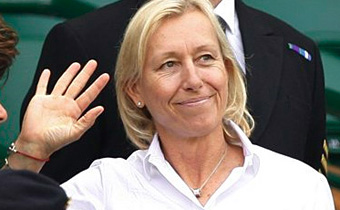BY NOREEN FAGAN – Athletes, in general, are not known for their support of gay rights and few pro athletes are brave enough to come out while still active in their sports.
There are some sports where homosexuality is tolerated. Martina Navratilova, arguably one of the greatest tennis players ever, came out in 1981 when homophobia was rampant in the United States and Canada.

Navratilova’s game did not suffer (visibly) because she was an out lesbian: she won 59 Grand Slam titles, including nine Wimbledon singles championships.
Today when athletes come out, either as gay or in support of gay rights, it is surprising and rather shocking, especially in sports such as hockey. Brendan Burke, son of Toronto Maple Leafs manager Brian Burke, came out in 2009. Sadly, Burke died in a car crash in 2010, but today his father is a strong advocate for gay rights.
The latest athlete to publicly declare his support for gay rights is Sean Avery of the New York Rangers.

Avery has released a video stating his support for gay marriage, part of a series by various New York celebrities that debuted in September.
According to The New York Times, Avery is one of the “few active athletes in American team sports to voice support for gay rights and is believed to be the first in New York to publicly advocate for same-sex marriage.”
The kicker is that Avery is from Pickering, Ontario – go Canada.
Update: Not everyone appreciates Avery’s support for gay marriage. Todd Reynolds, vice-president of Uptown Hockey management group tweeted that it “was very sad to read Sean Avery’s
misguided support of same-gender “marriage.” Legal or not it will always be wrong.”
 Why you can trust Xtra
Why you can trust Xtra


